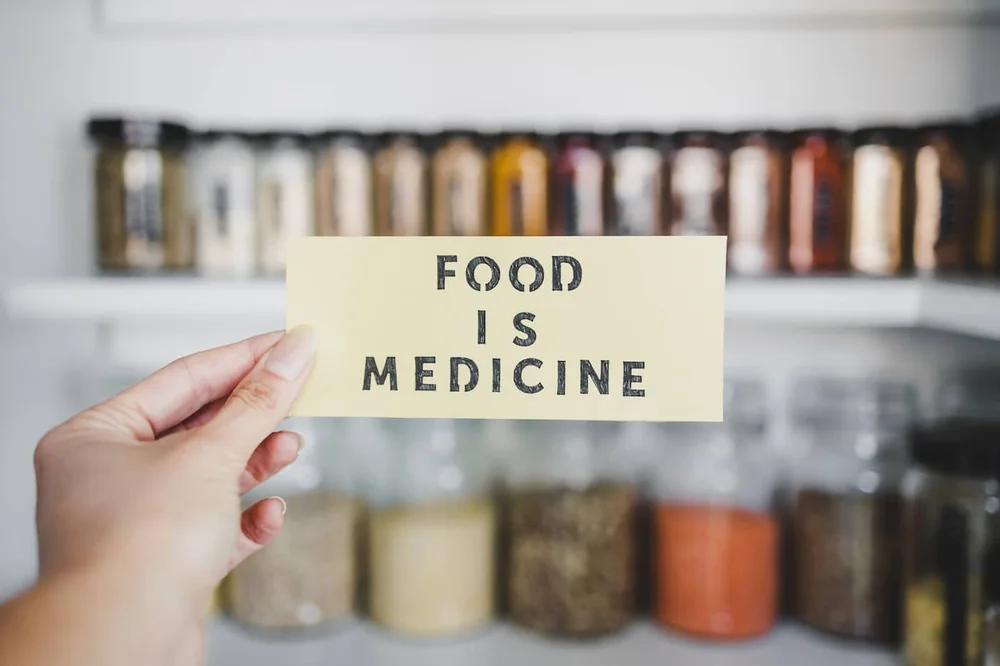Food is Medicine: A Beginners Guide to Better Health Through Your Diet
Finally, Western medicine is beginning to embrace the idea that food is medicine.
In aiming to solve the world’s diet-related health issues, health policy makers and medical researchers have determined that healthy foods need to be a formal part of patient care, a 2020 BMJ analysis reveals.
Indeed, the U.S. Office of Disease Prevention and Health Promotion has created a Food as Medicine initiative to ensure food-insecure communities have access to healthy food and to explore evidence-based nutritional assistance and medically tailored meals as part of healthcare.
While these are heartening developments, you don’t have to get sick or see a medical professional to enjoy the benefits healthy eating provides.
You can start taking a “food is medicine” approach to eating today by starting to consume foods that help to support and protect your health.
Here’s how.
Understanding “Food Is Medicine”
The idea behind “food is medicine” (used interchangeably with “food as medicine” in health policy) is simple: support health, reduce risk, and, in some instances, address serious health issues by changing what people eat.
Of course, healthy foods aren’t a replacement for actual medicine or medical treatments. Rather, embracing food as medicine is one important key to the puzzle of health.
What Foods Are Not Medicine?
One of the first steps to adopting a diet of healthy foods as medicine is to eliminate or minimize the foods that can cause harm.
Nutrition scientists from Harvard devised a list of unhealthy foods associated with most diet-related health problems.
Eating these foods habitually (and to the exclusion of other healthy foods) can slowly destroy your health over time. They’re inflammatory and increase your risk of blood sugar problems, heart health issues, poor immune function, problems with memory, neurodegenerative issues, and more.
Avoid or minimize your consumption of the following:
- Added Sugar
Added sugars (white sugar, brown sugar, honey, high-fructose corn syrup, etc.) may seem benign as they delight the taste buds, but they can wreak havoc on your health if overconsumed.
Habitual overconsumption of sugary foods and drinks can lead to skin conditions and wrinkles, heart health issues, blood sugar problems, low mood, liver problems, excess weight, hormonal imbalances, lower immune function, and more.
Too much is more than 36 grams of sugar a day for men, and 25 grams for women.
Beware of artificial sweeteners! They can cause digestive issues and may have a negative impact on cognitive function, mental health, and memory. Use a healthy sugar alternative instead.
- Baked Goods and “White” Carbohydrates
Cookies, cakes, pastries, donuts, and other treats are loaded with added sugar (as well as refined carbohydrates, unhealthy fats, and salt). The sugar-salt-fat content can trigger cravings for more sweets. Consuming white bread, pasta, potatoes, rice, and pancakes also can spike blood sugar levels.
- Processed and High-Fat Meats
Processed meats like pepperoni, ham, bacon, hot dogs, and deli meats offer protein but the curing, salting, smoking, and chemical preservatives involved in processing these meats makes them a health liability.
Red meat is generally high in saturated fat (unless you get a lean cut). Research has shown that too much saturated fat can raise unhealthy cholesterol levels and the risk of heart health issues.
- Too Much Salt
Most Americans get 1½ teaspoons of salt daily. Ideally, salt intake should be less than 1 teaspoon a day. While our bodies need salt, too much can increase blood pressure and the risk of heart health problems.
- Alcohol
Alcohol consumption lowers blood flow to the brain. If consumed routinely, it can shrink brain volume, cause hippocampus atrophy, and reduce the number of new brain cells. Alcohol consumption increases the risk of neurodegenerative issues affecting memory function too.
Alcohol can lead to problems with blood pressure, heart health, liver function, and your digestive health.

What Foods Are Medicine?
Now that you know what not to consume, let’s get to the good stuff!
Inspired by the Mediterranean Diet, considered one of the most healthful diets, a dietary pattern made up of the following foods is truly medicine for good health.
- A wide variety of colorful whole fruits and vegetables
Among them, berries, leafy greens, and cruciferous vegetables offer extraordinary benefits.
- Lots of beans, lentils, seeds, and nuts
The longest-lived cultures around the globe enjoy legumes as a staple food. Seeds and nuts are loaded with fiber, minerals, and healthy fats.
- Whole grains
Rich in complex carbohydrates, fiber, B vitamins, and more, enjoy a variety of whole grains such as buckwheat, gluten-free oats, quinoa, and brown rice.
- Plant oils like extra virgin olive oil or avocado oil
These are excellent sources of healthy fats. Tropical oils (coconut oil, etc.) offer healthy medium-chain triglycerides, but are best enjoyed in moderation due to their saturated fat content.
- Moderate amounts of seafood and fish
Enjoy fatty fish rich in omega-3 fatty acids like salmon, sardines, and mackerel regularly, but stay away from those known to have higher levels of mercury.
- Moderate amounts of low-fat or nonfat dairy
Enjoy probiotic- and protein-rich Greek yogurt or natural cheese.
- Fermented foods
Add probiotic-rich fermented foods to your diet such as sauerkraut, kimchi, kombucha, and yogurt.
- Moderate amounts of quality poultry
If you do strength training, protein consumption is needed to build muscle. Enjoy protein, such as pasture-raised, hormone-free eggs, with your breakfast to support healthy brain function.
- Minimal amounts of lean red meat
Enjoy occasional servings of lean red meat, organic and grass-fed, if possible.
- Fresh herbs and spices
Herbs and spices are chock-full of protective compounds and bring much flavor and enjoyment to food.
- Green and herbal teas
Drink plenty of water and beverages that promote relaxation and health. Green tea is a great alternative to coffee.
Reap the Rewards
A dietary pattern that includes an abundance of these healthy foods (and a minimal amount of the unhealthy foods) is associated with the following benefits:
- Greater longevity
- Healthy skin, teeth, and eyes
- Healthy muscles
- Healthy immune function
- Better brain function and mental health
- Strong bones
- Lowers risk of problems with heart health, blood sugar, and cellular function
- Healthy pregnancies and breastfeeding
- Healthy digestive function
- Healthy weight
Remember though, it’s a dietary pattern that matters. As long as the majority of what you eat is healthy, occasional indulgences aren’t going to set you back.
Here’s to making food your medicine!
At BrainMD, we’re dedicated to providing the highest purity nutrients to improve your physical health and overall well-being. For more information about our full list of brain healthy supplements, please visit us at BrainMD.
- What Are the 7 Healing Frequencies and Benefits of Sound Healing? - April 26, 2024
- Here Are Some of the Best Tension Release Exercises to Help You Feel Your Best! - April 17, 2024
- Foodscaping: How to Grow Healthy Foods In Your Own Garden! - April 12, 2024



